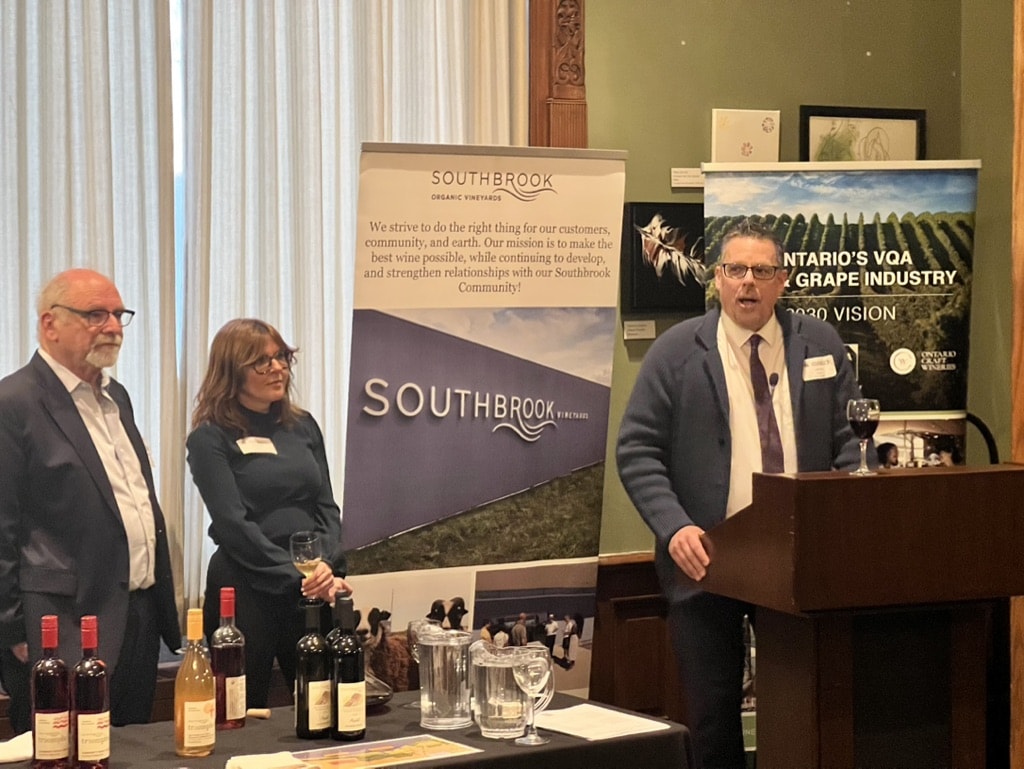Superlatives are flowing in response to the province’s announcement that it will implement a bundle of measures intended to support the wine industry.
“Gamechanger,” “transformational,” “we’re ecstatic,” and “it’s incredibly supportive,” were some of the sentiments from wine industry leaders.
One of the most welcome changes is the elimination of the 6.1 per cent tax on wine purchased at wineries — a levy the industry called punitive and unfair and has campaigned vigorously to have repealed.
That move and others, like increasing the number of places where beer, wine and cider can be sold, are part of a broad announcement made on Thursday, describing sweeping changes to the way beer and wine will be sold.
“I’m very happy. Since the spring we’ve made a combined effort to make a big push, so now it’s a big thank you to the government for these measures,” said Matthias Oppenlaender, chair of Grape Growers of Ontario.
A coalition of industry leaders has campaigned with intensity over the past several months to demonstrate the economic potential of the industry — and the need to remove obstacles to competitiveness.
Two major reports detailed the opportunities and the support needed to achieve them.
“We made sure the government was well-educated on the needs of the wine industry, and the government listened. We were able to illustrate that we are the highest taxed wine industry in the world,” said Del Rollo, chair of Wine Growers Ontario, adding “this announcement is the culmination of many years of work.”
Besides rolling back the 6.1 per cent tax, the government announced a five-year extension to the VQA support program.
When VQA wines are sold at the LCBO, the program returns some of the taxes to the Ontario wineries. In addition to the extension, the government removed the current cap on the program.
Debbie Zimmerman, chief executive of Grape Growers of Ontario, said that’s “incredibly supportive for anyone making VQA wine and will drive demand for grapes.”
The government announced it is expanding the number of convenience, grocery and big-box stores able to sell beer, wine, cider and coolers by up to 8,500 new stores.
That change will take effect in 2026.
The current 40 per cent shelf space requirements for Ontario wines and ciders will be extended to the new retailers to help small producers compete.
“With dedicated shelf space at the new retail channels we have a fighting chance,” said Oppenlaender.
The government also said it will direct the LCBO to promote and prioritize Ontario-made products.
“I’m excited about the direction to the LCBO. It can become an economic development engine by drawing people to Ontario made beverages — and since the government owns the LCBO it makes sense for them to direct it to help us grow our share,” said Rollo.
“The LCBO’s commitment to highlight smaller wineries with shelf space and promotion is of huge importance to smaller and mid-sized wineries,” said Carolyn Hurst, chair of Ontario Craft Wineries.
She also applauded the move to extend the Wine Marketing Fund for up to five years.
“The VQA marketing fund is extremely important so we can get our message out to Ontario consumers about the quality of Ontario wines and build up brand recognition,” Hurst explained, adding, “It shows a commitment to support local businesses.”
A wide range of details are still to be worked out, including the timing of when the 6.1 per cent tax will be eliminated. The government has said it will table legislation to do that, but it didn’t indicate when.
Niagara area MPP Wayne Gates has tabled three private members bills seeking to cancel that tax since 2018.
The NDP member said the announcement to scrap the tax “has been a long time coming” and he is hoping it will happen sooner than later.
Gates said he plans to ask the finance minister how soon it will be implemented.
Combined, “these changes will be transformational for local wineries. It’s been tough for wineries recently. This will allow wineries to get into the black, which in turn will lead to more investment in areas like capital, staffing, marketing,” said Rollo.
According to Oppenlaender, “it’s very timely to bring resources back into the industry. These measures will be a game changer, and they show a commitment to the wine business.”
“This is a very good shot in the arm, so we’re celebrating now, but we do have more work to do,” Rollo added.










